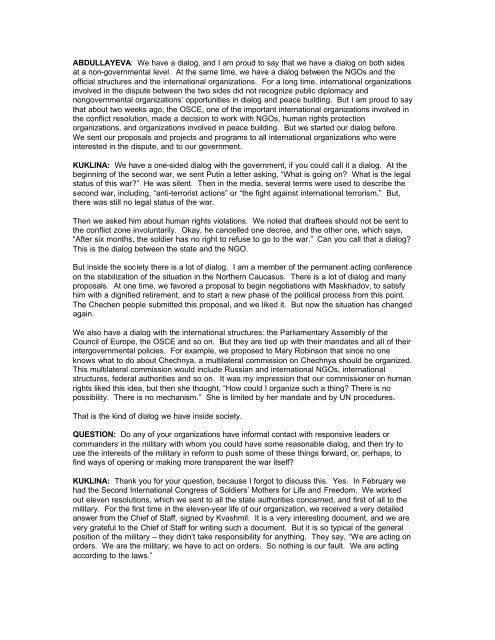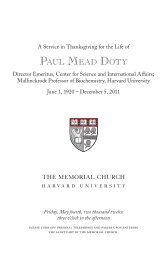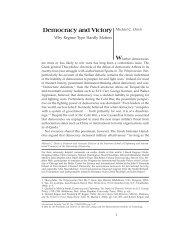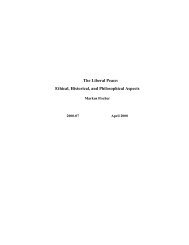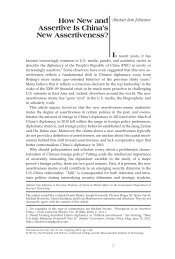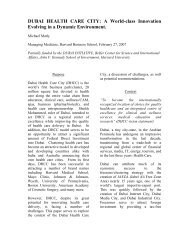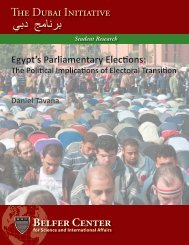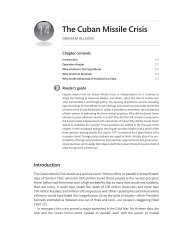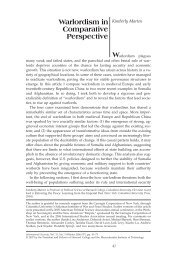Civil Society and Peace-building in the North and South Caucasus ...
Civil Society and Peace-building in the North and South Caucasus ...
Civil Society and Peace-building in the North and South Caucasus ...
Create successful ePaper yourself
Turn your PDF publications into a flip-book with our unique Google optimized e-Paper software.
ABDULLAYEVA: We have a dialog, <strong>and</strong> I am proud to say that we have a dialog on both sides<br />
at a non-governmental level. At <strong>the</strong> same time, we have a dialog between <strong>the</strong> NGOs <strong>and</strong> <strong>the</strong><br />
official structures <strong>and</strong> <strong>the</strong> <strong>in</strong>ternational organizations. For a long time, <strong>in</strong>ternational organizations<br />
<strong>in</strong>volved <strong>in</strong> <strong>the</strong> dispute between <strong>the</strong> two sides did not recognize public diplomacy <strong>and</strong><br />
nongovernmental organizations’ opportunities <strong>in</strong> dialog <strong>and</strong> peace <strong>build<strong>in</strong>g</strong>. But I am proud to say<br />
that about two weeks ago, <strong>the</strong> OSCE, one of <strong>the</strong> important <strong>in</strong>ternational organizations <strong>in</strong>volved <strong>in</strong><br />
<strong>the</strong> conflict resolution, made a decision to work with NGOs, human rights protection<br />
organizations, <strong>and</strong> organizations <strong>in</strong>volved <strong>in</strong> peace <strong>build<strong>in</strong>g</strong>. But we started our dialog before.<br />
We sent our proposals <strong>and</strong> projects <strong>and</strong> programs to all <strong>in</strong>ternational organizations who were<br />
<strong>in</strong>terested <strong>in</strong> <strong>the</strong> dispute, <strong>and</strong> to our government.<br />
KUKLINA: We have a one-sided dialog with <strong>the</strong> government, if you could call it a dialog. At <strong>the</strong><br />
beg<strong>in</strong>n<strong>in</strong>g of <strong>the</strong> second war, we sent Put<strong>in</strong> a letter ask<strong>in</strong>g, “What is go<strong>in</strong>g on? What is <strong>the</strong> legal<br />
status of this war?” He was silent. Then <strong>in</strong> <strong>the</strong> media, several terms were used to describe <strong>the</strong><br />
second war, <strong>in</strong>clud<strong>in</strong>g, “anti-terrorist actions” or “<strong>the</strong> fight aga<strong>in</strong>st <strong>in</strong>ternational terrorism.” But,<br />
<strong>the</strong>re was still no legal status of <strong>the</strong> war.<br />
Then we asked him about human rights violations. We noted that draftees should not be sent to<br />
<strong>the</strong> conflict zone <strong>in</strong>voluntarily. Okay, he cancelled one decree, <strong>and</strong> <strong>the</strong> o<strong>the</strong>r one, which says,<br />
“After six months, <strong>the</strong> soldier has no right to refuse to go to <strong>the</strong> war.” Can you call that a dialog?<br />
This is <strong>the</strong> dialog between <strong>the</strong> state <strong>and</strong> <strong>the</strong> NGO.<br />
But <strong>in</strong>side <strong>the</strong> society <strong>the</strong>re is a lot of dialog. I am a member of <strong>the</strong> permanent act<strong>in</strong>g conference<br />
on <strong>the</strong> stabilization of <strong>the</strong> situation <strong>in</strong> <strong>the</strong> Nor<strong>the</strong>rn <strong>Caucasus</strong>. There is a lot of dialog <strong>and</strong> many<br />
proposals. At one time, we favored a proposal to beg<strong>in</strong> negotiations with Maskhadov, to satisfy<br />
him with a dignified retirement, <strong>and</strong> to start a new phase of <strong>the</strong> political process from this po<strong>in</strong>t.<br />
The Chechen people submitted this proposal, <strong>and</strong> we liked it. But now <strong>the</strong> situation has changed<br />
aga<strong>in</strong>.<br />
We also have a dialog with <strong>the</strong> <strong>in</strong>ternational structures: <strong>the</strong> Parliamentary Assembly of <strong>the</strong><br />
Council of Europe, <strong>the</strong> OSCE <strong>and</strong> so on. But <strong>the</strong>y are tied up with <strong>the</strong>ir m<strong>and</strong>ates <strong>and</strong> all of <strong>the</strong>ir<br />
<strong>in</strong>tergovernmental policies. For example, we proposed to Mary Rob<strong>in</strong>son that s<strong>in</strong>ce no one<br />
knows what to do about Chechnya, a multilateral commission on Chechnya should be organized.<br />
This multilateral commission would <strong>in</strong>clude Russian <strong>and</strong> <strong>in</strong>ternational NGOs, <strong>in</strong>ternational<br />
structures, federal authorities <strong>and</strong> so on. It was my impression that our commissioner on human<br />
rights liked this idea, but <strong>the</strong>n she thought, “How could I organize such a th<strong>in</strong>g? There is no<br />
possibility. There is no mechanism.” She is limited by her m<strong>and</strong>ate <strong>and</strong> by UN procedures.<br />
That is <strong>the</strong> k<strong>in</strong>d of dialog we have <strong>in</strong>side society.<br />
QUESTION: Do any of your organizations have <strong>in</strong>formal contact with responsive leaders or<br />
comm<strong>and</strong>ers <strong>in</strong> <strong>the</strong> military with whom you could have some reasonable dialog, <strong>and</strong> <strong>the</strong>n try to<br />
use <strong>the</strong> <strong>in</strong>terests of <strong>the</strong> military <strong>in</strong> reform to push some of <strong>the</strong>se th<strong>in</strong>gs forward, or, perhaps, to<br />
f<strong>in</strong>d ways of open<strong>in</strong>g or mak<strong>in</strong>g more transparent <strong>the</strong> war itself?<br />
KUKLINA: Thank you for your question, because I forgot to discuss this. Yes. In February we<br />
had <strong>the</strong> Second International Congress of Soldiers’ Mo<strong>the</strong>rs for Life <strong>and</strong> Freedom. We worked<br />
out eleven resolutions, which we sent to all <strong>the</strong> state authorities concerned, <strong>and</strong> first of all to <strong>the</strong><br />
military. For <strong>the</strong> first time <strong>in</strong> <strong>the</strong> eleven-year life of our organization, we received a very detailed<br />
answer from <strong>the</strong> Chief of Staff, signed by Kvashmil. It is a very <strong>in</strong>terest<strong>in</strong>g document, <strong>and</strong> we are<br />
very grateful to <strong>the</strong> Chief of Staff for writ<strong>in</strong>g such a document. But it is so typical of <strong>the</strong> general<br />
position of <strong>the</strong> military – <strong>the</strong>y didn’t take responsibility for anyth<strong>in</strong>g. They say, “We are act<strong>in</strong>g on<br />
orders. We are <strong>the</strong> military; we have to act on orders. So noth<strong>in</strong>g is our fault. We are act<strong>in</strong>g<br />
accord<strong>in</strong>g to <strong>the</strong> laws.”


